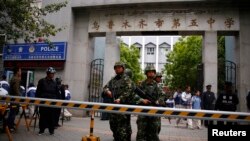China is continuing what it terms its war on terror in the far west province of Xinjiang, detaining five people and seizing 1.8 metric tons of bomb-making material.
A statement by the local government in the Hotan area of southern Xinjiang said two explosives-producing sites were also destroyed in the Monday raid.
Beijing has announced a year-long security crackdown following last week's attack that killed 43 people and wounded more than 90 in the regional capital, Urumqi.
Officials say the Hotan suspects planned a similar attack, using explosives and ramming their cars through crowds. They also watched "violent terrorist and religious extremist videos."
The incident in Urumqi last week was the latest in a series of violent attacks that are thought by many to be the work of Uighurs, a largely Muslim ethnic minority group that is native to Xinjiang.
Many Uighurs in China often complain of religious and cultural discrimination.
On April 30, two attackers set off explosives and slashed passengers at an Urumqi train station, killing one and wounding 79.
On March 1, eight knife-wielding men attacked passengers at a train station in Yunnan province, killing 29 people in what state media described as "China's 9/11."
Beijing says the attacks were carried out by violent separatists with backing from overseas and has promised to crush the low level insurgency.
Following the latest Urumqi attack, armed police carrying submachine guns with bayonets are patrolling at many important roads and intersections in Xinjiang.
On Monday, China said it broke up 23 terrorist gangs and arrested more than 200 people in three areas of southern Xinjiang.
A statement by the local government in the Hotan area of southern Xinjiang said two explosives-producing sites were also destroyed in the Monday raid.
Beijing has announced a year-long security crackdown following last week's attack that killed 43 people and wounded more than 90 in the regional capital, Urumqi.
Officials say the Hotan suspects planned a similar attack, using explosives and ramming their cars through crowds. They also watched "violent terrorist and religious extremist videos."
The incident in Urumqi last week was the latest in a series of violent attacks that are thought by many to be the work of Uighurs, a largely Muslim ethnic minority group that is native to Xinjiang.
Many Uighurs in China often complain of religious and cultural discrimination.
On April 30, two attackers set off explosives and slashed passengers at an Urumqi train station, killing one and wounding 79.
On March 1, eight knife-wielding men attacked passengers at a train station in Yunnan province, killing 29 people in what state media described as "China's 9/11."
Beijing says the attacks were carried out by violent separatists with backing from overseas and has promised to crush the low level insurgency.
Following the latest Urumqi attack, armed police carrying submachine guns with bayonets are patrolling at many important roads and intersections in Xinjiang.
On Monday, China said it broke up 23 terrorist gangs and arrested more than 200 people in three areas of southern Xinjiang.





